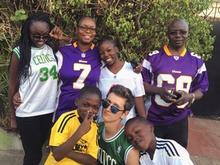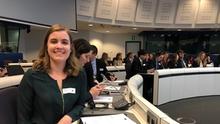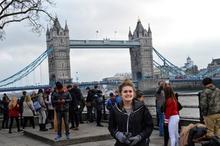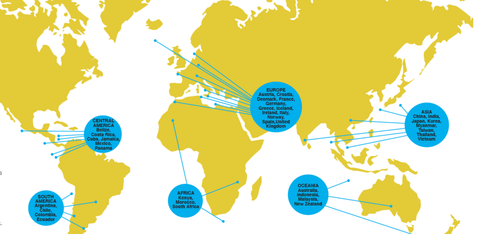HSJMC students study abroad at a high rate.
By Amanda Fretheim Gates
Journalists and strategic communicators need to see stories from all angles to do their jobs effectively. And while college classes can open eyes and expand boundaries, nothing beats experiencing a different country, culture or media landscape. That may be why on average HSJMC students study abroad more than do students in any other department in the College of Liberal Arts (except for Spanish & Portuguese Studies). In 2017, 1 in 7 HSJMC students participated in learning abroad. In the last two academic years, HSJMC students have studied in nearly 60 countries.
Most students who want to study abroad can get a lot of bang for their buck. Many programs can fulfill liberal education credits, major/minor credits, language requirements or other upper-level college credits—or all of the above—while allowing students to still graduate in four years. What makes HSJMC students so prime for studying abroad?
Rebecca Rassier, associate director of student services, meets regularly with students who want to fit a study abroad opportunity into their schedules, and according to Rassier, it’s usually not hard to do. She appreciates the collaboration between HSJMC and the Learning Abroad Center. Together, the two groups have been able to enhance programs that both offer courses appropriate for the journalism program and take place in destinations that are appealing to students.
HSJMC students study abroad more than do students in any other department in the College of Liberal Arts (except for Spanish & Portuguese Studies).
In 2017, 1 in 7 HSJMC students participated in learning abroad.
In the last two academic years, HSJMC students have studied in nearly 60 countries.
Rassier also credits journalism majors for being planners; they come into Student Services well enough in advance to allow many study abroad opportunities to work. “We help identify their goals, so we can find the best program that works for them,” she said. Student goals usually break down into several main areas: type of study, an internship component and what country they want to experience. HSJMC has many students who are double majors or studying for a minor—such as a second language—and those factors can also play into where they decide to study abroad.
The School also has a new scholarship specifically for students who study abroad. The Judy Conrad and Jim Stai Study Abroad Scholarship was pledged in 2017 and given to its first student in the 2018-19 academic year. Conrad was excited about helping students in this way. “I love traveling myself, so when it was suggested I set up a scholarship to help students to study abroad, I thought that was a great idea,” she said. “We’re always telling our grandkids that you can’t truly learn about the world through TV. Being there and actually experiencing a place is a very different thing. I’m just glad I can help encourage others to learn through experience via the scholarship.”
While HSJMC students study everywhere from Buenos Aires to Hong Kong, there are several programs that are especially popular because they meet journalism requirements or offer internships. For example, programs in both Rome and Florence offer journalism-approved courses as well as three-credit internship experiences.
According to Jessica Harnett, associate program director in the Learning Abroad Center, the Italian programs are particularly well-suited for journalism students. “The local companies really value the English language because these businesses want to get the word out to tourists,” she said. Student interns often help with blogging, social media and other communication activities, which are all skills that boost resumes.
A program in the United Kingdom also offers journalism-approved courses and internships for three to six credits. Ninety percent of HSJMC students who study in London complete an internship as well. Other popular programs for journalism students take place in Denmark and Dublin. The possibilities and opportunities are endless.
MARCUS AARSVOLD, NAIROBI, KENYA, SPRING 2017
Marcus Aarsvold (B.A. ‘17) had wanted to study abroad since he was in high school. In Spring 2017, he traveled to Nairobi, Kenya, through the Minnesota Studies in International Development (MSID) program. The semester consisted of seven weeks of classes every day and a six-week internship. He stayed with a host family, which he considered one of the most valuable components of his time abroad.
“The classes I took were entry level Kiswahili, international development, country analysis, and community engagement in the Global South. I loved how enthusiastic and energized our professors were. Their love for their country and spreading accurate information to us really impacted the way I think about the world and the way it develops. Several times I felt helpless, when it came to the white superiority complex and colonialism, or other inequalities that were cemented in our global society and still affect people to this day. However, this helplessness in and of itself opened my eyes to the privileges I am awarded simply because of where I was born and how I look. Another large takeaway was the importance of education and how its access is the key to further development.
“I participated in a six-week internship for a media NGO (non-governmental organization) called Slum-TV. It focuses on teaching interested youth who reside in informal settlements the technical aspects of film, photography and journalism. The main tasks they had me do varied from updating and consolidating their social media platforms to helping students with Adobe editing software. Holistically though, I was there to learn. I sat in on meetings and shoots and learned about how hard it is to finance and maintain an NGO in developing country.
“I found it most valuable to listen and learn from the people in each of the communities within Nairobi that I was fortunate enough to explore. Halfway through the program I made it a goal of mine to think about how I, as a white privileged American journalist, could best tell the story of people in a community I could not relate to. My experience augmented my journalism education because I learned how crucial it is to think about the way one crafts a story. My job as a journalist is to give people in various communities a platform to share their stories to broaden the perspectives of my audience. My experience with Slum-TV put me in that position and taught me how small I am, but how big journalism can be if one acts as a conduit for the spread of valuable information.
“My best moment from abroad was simply hanging out with my host family, The Okoths. They were the warmest, most caring and authentic family. Altogether, I cannot articulate the gratitude I have for them nor the lessons I learned from the acceptance I felt coming into their home as a complete stranger and leaving it as a son.”
PARIS GRABEEL, FREIBURG, GERMANY, SPRING 2018
Paris Grabeel, a senior studying strategic communication, knows she wants to live and work abroad one day, so her first step was to study abroad. She was drawn to the IES European Union program in Freiburg. She also stayed in Freiburg for the 2018 summer to participate in an internship and work on her professional German-language skills.
“I was able to tailor some of my coursework to fit my strategic communication interests. For example, I wrote a hypothetical news release and a story for an industry magazine as assignments. I found that being one of only two strategic communication track students in the program, I was able to provide a different perspective to a lot of topics discussed in class. One time, we were discussing the blame game that Member State governments play with the European Union—they blame the EU for any bad policies but take credit for any good ones—which ends up with the general public having negative attitudes toward the EU. I mentioned how, rather than seeing this as a strictly political issue, I saw it as a lack of effective communication with its publics on the EU’s part. It was interesting to see how many of my classmates had not thought of the issue in that light.
“I took mostly political science, international relations and economics classes. I also took a German language course. I really enjoyed being able to take courses that focus on specific issues, such as the Black Sea Region or EU-U.S. relations. They allowed me to develop a certain level of expertise in that subject area.
“As part of the program, we visited major organizations and EU institutions across Europe, and I met with a lot of fascinating professionals. These experiences helped me figure out what topics I’m passionate or curious about and what kinds of organizations I want to work at eventually. My experiences also gave me the opportunity to narrow down what topic I wanted to research for my senior thesis.
“There were so many moments that were important to me for so many different reasons, like our trip to Brussels, Belgium, where we met with officials from EU institutions, think tanks and the Russian and Turkish embassies. It was such an incredible experience meeting these professionals and learning about the work they are doing. I was able to connect what I was learning from them with what I have learned in my coursework, both in Freiburg and Minnesota.”
OLIVIA HULTGREN, LONDON, ENGLAND, SPRING 2018
Olivia Hultgren, a senior studying professional journalism, chose the London program primarily for its internship component at Business Traveller magazine. Taking classes and getting work experience at the same time in a country with a huge media industry was very appealing to her.
“I was an editorial intern, so I worked mostly with content. I wrote articles for the BT website, and I worked on a weekly hotel update article, where I outlined new hotels opening around the world. I also wrote the occasional print article for the magazine. In addition to that, I did a lot of proofreading and editing content, fact-checking and picture research. It was nice because I got to see the ins and outs of magazine production as well as get writing experience.
“I loved my classes. I took Media Ethics, Travel Writing and Post-War British Pop Culture. The best part about all of them was my professors, who were all wonderful people and extremely capable teachers. They also worked in international angles on the topics they taught, so we learned about what was going on in Britain as well as the U.S. Travel writing was great, because we did a ton of writing and then got feedback on it, so it was a very hands-on approach to learning. My pop culture class was probably my favorite though, because I learned about British culture and how music and the arts has influenced it over the years. Our professor was British too, so it was pretty authentic.
“My brother once told me that you don’t understand your own culture until you’ve experienced that of another. I think studying abroad is something everyone needs to do. It makes you think differently about your own upbringing, the place where you grew up and the places you’ve already been. It’s also kind of like just throwing yourself in the water and learning to swim. It makes you more confident, independent and capable, but it also exposes you to different opinions and brings you closer to understanding cultures around the world. I feel like I know a lot more, not just about travel but about global politics and economics and, especially, global media.”



